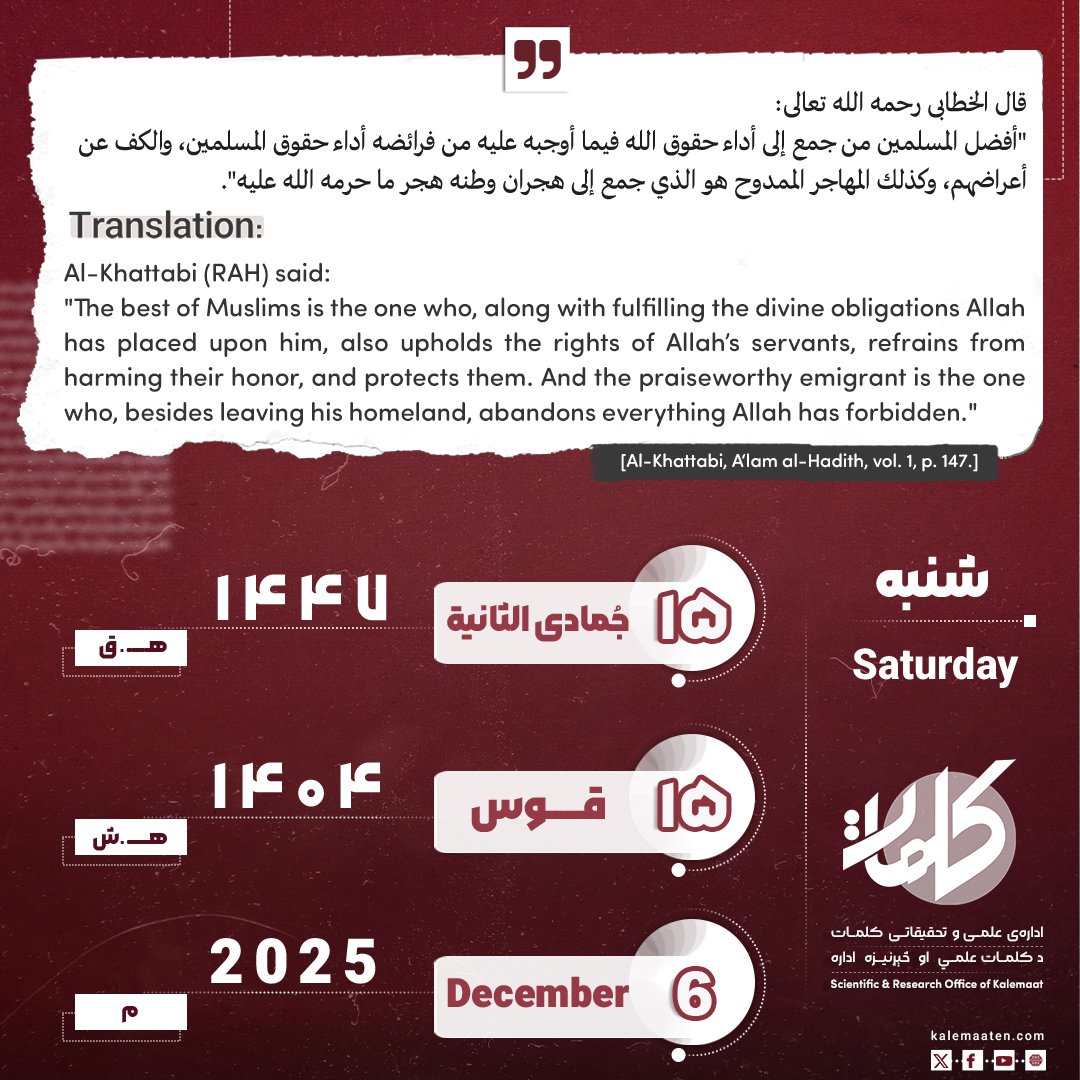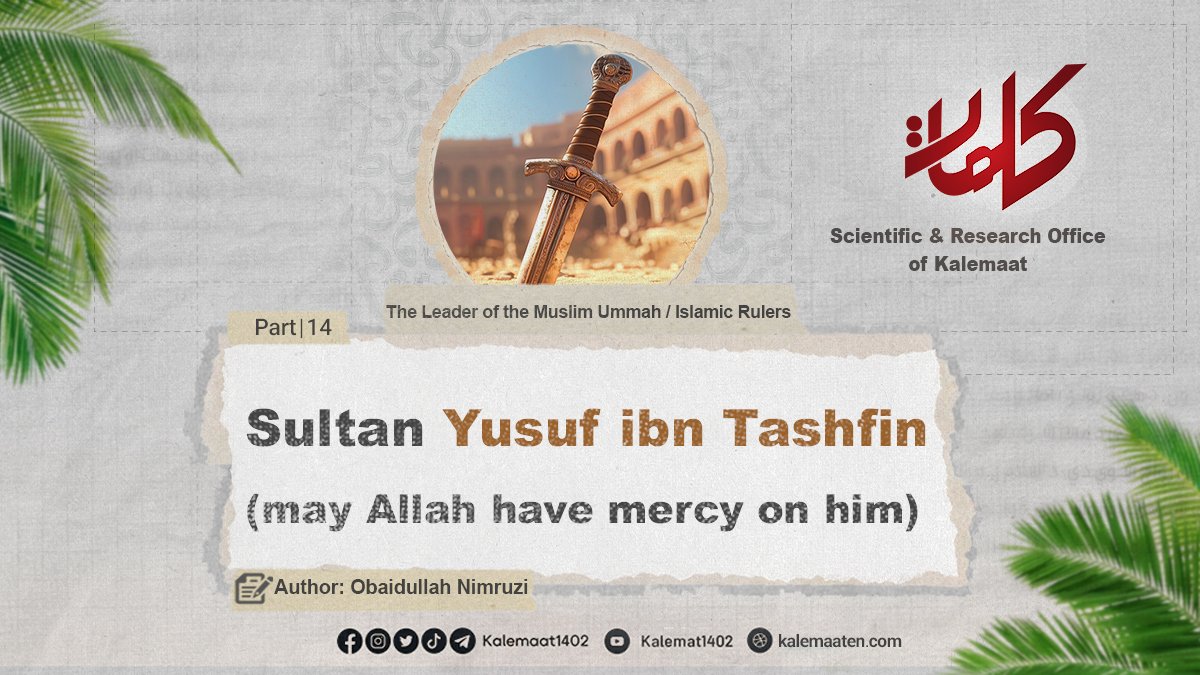Author: Obaidullah Nimruzi
The Guardian of Al-Andalus (Spain): Sultan Yusuf ibn Tashfin [MABH] (Part 14)
The Selection of a Successor: Allegiance to Abu Bakr ibn ‘Umar
Abu Bakr ibn ‘Umar ibn Tarlakakin al-Lamtuni was a man from the Lamtuna tribe, and his mother, Safiyyah, was from the Jadalah tribe. He was the one who assumed leadership after the martyrdom of his brother, who had been a military commander of the Almoravids and a staunch defender of Islam. [1]
Abu Bakr was considered one of the prominent figures among the Almoravids. After Sheikh Abdullah ibn Yasin, he held the highest position within the leadership structure. When the elders and leaders of the Almoravids gathered to assess the situation and select a successor for their late leader, Abu Bakr ibn ‘Umar was the first nominee for this role. He had deep insight into the conditions of the time and was one of Sheikh Abdullah ibn Yasin’s close and trusted companions.
This companionship and extensive experience beside Ibn Yasin had equipped him with the ability to manage complex situations and guide the Almoravids along the right path. Moreover, he truly embodied the spirit of the Almoravids, as his lifestyle was also deeply rooted in the principles of asceticism, sacrifice, justice, enjoining good, forbidding evil, and upholding Islamic values.
Because of these qualities, without any opposition or conflict, Abu Bakr ibn ‘Umar was chosen as the new leader of the Almoravids. Until the end of his life, no one contested his leadership. He continued the Islamic mission in all its dimensions and faithfully carried on the path of his mentor.
The Hero of Jihad and the Elimination of the Barghawata Sedition
After the pledge of allegiance to Abu Bakr ibn ‘Umar was completed, he immediately rose to uproot a long-standing threat that previous Islamic states had failed to eliminate—an ominous calamity that had pierced the body of the Muslim Ummah like a poisoned dagger. It posed both a military and ideological threat. Notably, the Almoravids had lost their most valuable asset in the struggle against this deviant group: Sheikh Abdullah ibn Yasin (may Allah have mercy on him), who was martyred on the battlefield against the Barghawata.
Faced with this grave wound, Abu Bakr ibn ‘Umar rose with resolve, mobilized the army, arranged the ranks, and—with complete trust in Allah—entered the battlefield to purge the Ummah of this evil. [2]
A fierce battle ensued, and the mujahideen displayed remarkable steadfastness. Before long, the winds of victory began to blow. The hearts of the Barghawata’s followers filled with terror. They fled the battlefield, and the Almoravids pursued them until their forces were dispersed and their military strength was shattered. Ultimately, they surrendered and submitted. This time, with renewed faith, they repented from their false ways, returned to the Qur’an and Sunnah, and completely abandoned the deviant beliefs and ideologies that had led them to war against the Muslims.
With the complete destruction of the Barghawata’s power and the exposure of their heretical foundations, the Almoravids not only served the local region but also rendered a great service to the entire Muslim Ummah. They illuminated this dark land with the light of Islam and made it an integral and fortified part of the Ummah. Moreover, by eliminating this group—alien to the religious and intellectual fabric of the Ummah—they paved the way for the unification of the Maghreb regions under a single government and unified law.
After this great victory, no trace of the Barghawata creed remained. Abu Bakr ibn ‘Umar gathered the spoils of war, distributed them among the Almoravids, and then returned to the city of Aghmat. [3]
In Aghmat, a new chapter began. With profound insight, Abu Bakr prepared himself for a fresh phase. The tribes of Sanhaja, Jazula, and Masmuda rallied to him, and he had to organize this new force and employ it in the path of jihad and the broader mission of the Almoravids.
Thus, a powerful army was formed, through which the region of Fazaz, its surrounding mountains, and the entirety of the land of Zanata came under Almoravid control. Even the areas of Miknasa and Lawata were conquered. [4]
It appears these regions had been under the rule of al-Mahdi ibn Yusuf ibn Tuwali, who, faced with the pressure of the Almoravid army, saw no choice but to surrender. He met with Abu Bakr ibn ‘Umar and pledged allegiance. Ibn al-Khatib also notes that the ruler of these lands, al-Mahdi ibn Yusuf, was defeated and, seeing no alternative, submitted himself to Abu Bakr. [5]
With these areas joining the Almoravids, the first step of Abu Bakr ibn ‘Umar’s grand plan for the post-Barghawata era was realized. He then returned to Aghmat—and that year was 452 AH. [6]
Continues…
Previous Part/ Next Part
[1] Ibn Abi Zar’, Rawd al-Qirtas, p. 85.
[2] Ibn Khaldun, Tarikh al-Ibar, vol. 6, p. 170, Dar al-Fikr, Beirut, 2006.
[3] Ibn Abi Zar’, Rawd al-Qirtas, p. 85.
[4] Ibn Abi Zar’, ibid., p. 85; al-Nasiri, al-Istiqsa, vol. 2, p. 20.
[5] Ibn al-Khatib, A’mal al-A’lam, vol. 3, p. 232.
[6] Ibn Abi Zar’, Rawd al-Qirtas, p. 85; Ibn al-Khatib, A’mal al-A’lam, vol. 3, p. 232.



